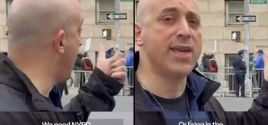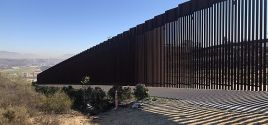U.S. Measures Anti-Terror Laws vs. Britain'sSome in the GOP want a more flexible system, such as that used to uncover an alleged plot. Critics say such changes would trample rights.Los Angeles Times Aug. 20, 2006 |
Popular 
Rep. Thomas Massie Warns Congress is Trying to Pass Hate Speech Laws to Outlaw Criticism of Israel

ADL Urged Congress to Pass FISA Law Spying on Americans to 'Protect Israel'

'Sniper Seen on Roof Overlooking Pro-Palestine Protest' at Indiana University

Claim Jewish Student Was 'Stabbed In The Eye' by Pro-Palestine Protester Draws Mockery After Video Released

Axios Poll: Majority of Americans Now Want Mass Deportations
 WASHINGTON — The uncovering of an alleged bomb plot in London has focused new attention on the differences in the legal arsenals available to terrorism hunters in the U.S. and Britain. Some Republican lawmakers contend the U.S. should emulate parts of the British model because it gives agents more flexibility in monitoring and detaining suspects. But critics say such expansive powers come at a great cost: British laws are generally considered more hostile to civil liberties, and trying to adopt such rules in the U.S. would create legal and public outcry. While the London case has underscored the importance of efficient police work and secret surveillance, it is far from clear whether Britain's less-restrictive laws for combating terrorism deserve the credit. A closer look shows some similarities between the British and American rules, due in part to a series of aggressive anti-terrorism moves by the Bush administration since the attacks of Sept. 11, 2001. "The general consensus, at least initially, seems to be that many of the tools are comparable," said an administration official, speaking on condition of anonymity, who is familiar with the early discussions about broadening executive powers. The preemptive strike in London is nonetheless sparking a legal and public debate about whether lawmakers are doing all they can to equip U.S. authorities with the tools they need. The Justice Department announced last week that it was launching a review of U.S. and British anti-terrorism laws. But some officials have downplayed the chances that the effort will lead to new legislation. The administration's main anti-terrorism priority in Congress is a surveillance bill that, in some ways, would give authorities more leeway than what is allowed in Britain. U.S. officials appear to be hoping that generalized concern about terrorism raised by the London case will help engender support for the legislation, which was worked out between the White House and Senate Judiciary Committee Chairman Arlen Specter (R-Pa.). With Congress on summer recess, little is likely to happen before the fall, when a number of House and Senate committees are expected to consider what, if any, curbs should be placed on domestic surveillance. But some lawmakers are already asking whether the United States should consider adopting at least some aspects of Britain's counter-terrorism system. In particular, they have argued that it is too cumbersome to obtain warrants for domestic surveillance in the United States, as is currently required, through a special court established under the 1978 Foreign Intelligence Surveillance Act. "The British have better tools. If you want to get a warrant, all you have to do is call up a minister," Sen. Pat Roberts (R-Kan.), the chairman of the Senate Intelligence committee, said last week. "I'm not advocating that in the United States with the FISA court or anything else, but it seems to me that they have taken actions that would really speed that along." News reports said British authorities received a tip that led them to the men involved in the alleged plot. Investigators then used secret surveillance, including intercepting phone calls, to obtain more information. Bush administration officials said the British experience may contain lessons for America. "What helped the British in this case is the ability to be nimble, to be fast, to be flexible, to operate based on fast-moving information," said Homeland Security Secretary Michael Chertoff, who formerly headed the Justice Department's criminal division. But when pressed, he refused to say the law should be changed. "I don't think there's any specific authority I would suggest we need now," he said Aug. 13 on ABC's "This Week." Critics say the administration has not shown how the British case demonstrates a need for changing U.S. laws. "Their legal regime [in Britain] is similar to ours," said Bruce Fein, a former Reagan administration lawyer. "The government should have to bear the burden to show the need for making a change. "In my judgment, this case cuts the other way. The powers they are requesting are irrelevant to the cracking of this case in Britain." When it comes to surveillance, the British laws share some basic features with those in the United States. Investigators in Britain, like their counterparts here, may intercept phone calls and eavesdrop on private conversations, but only under what British authorities describe as a system of "strict control and oversight" that includes individual warrants. |



